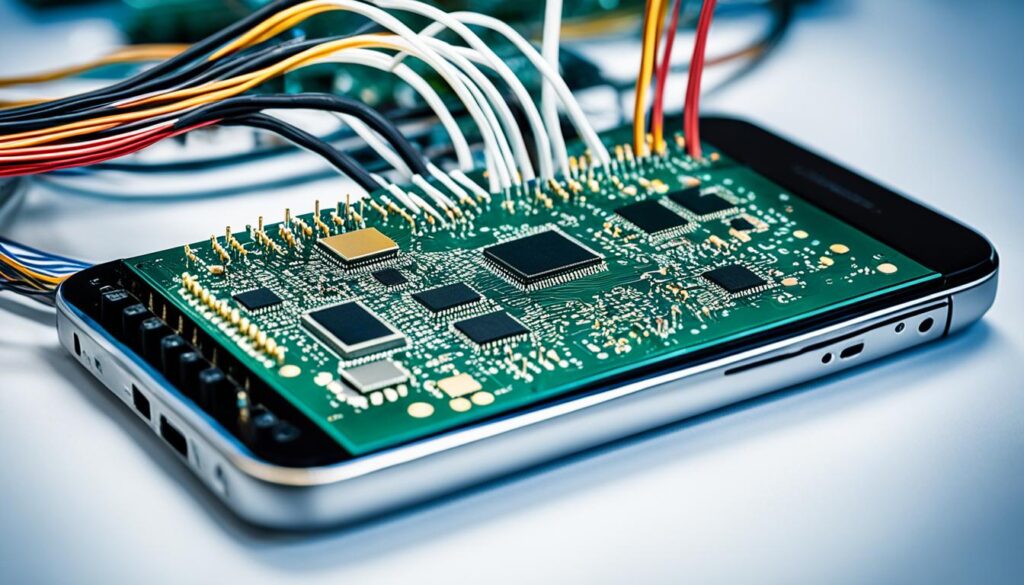Smartphones as Computers: Fact or Fiction?
Are smartphones considered computers? What sets them apart from traditional computers? These questions have become increasingly relevant as smartphones continue to evolve and gain more computing power. Gone are the days when phones were merely used for making calls. Smartphones have transformed into versatile devices that offer a multitude of capabilities, blurring the lines between phones and computers.
Microprocessors give smartphones, like conventional computers, their power and allow them to carry out a variety of tasks. However, smartphones are designed to be compact and portable, making them more convenient for everyday use. With advancements in microprocessor technology, smartphones now boast impressive computing power that rivals some laptops.
So, what differentiates smartphones from computers? The answer lies in their form factor and purpose. While computers are typically larger, stationary devices primarily used for complex tasks, smartphones are handheld devices designed for on-the-go use. They prioritize portability, connectivity, and ease of use, providing quick access to information, communication, and a range of apps.
Throughout this article, we will explore the evolution of smartphones, the technology behind them, their power compared to traditional computers, and their role as productivity tools. By examining these aspects, we can gain a better understanding of whether smartphones can truly be considered computers.
Key Takeaways:
- Smartphones have evolved into powerful computing devices, blurring the lines between phones and computers.
- They are compact and portable, prioritizing convenience and on-the-go use.
- Smartphones offer impressive computing power that rivals some laptops.
- They differentiate themselves from traditional computers through their form factor and purpose.
- Smartphones prioritize portability, connectivity, and ease of use.
The Evolution of Mobile Technology
Before smartphones, consumers had a choice between mobile phones for calls and texts or personal organizers for business functions. However, with the convergence of these two products, smartphones emerged as the dominant personal accessory and business tool. The evolution of mobile phone technology revolutionized the way we live and fulfill various functions.
The early mobile phones were primarily designed for making calls and sending text messages. They were bulky, expensive, and lacked advanced features. On the other hand, personal organizers, like the Palm Pilot and BlackBerry devices, cater to business professionals with their focus on organization and productivity.
But as technology advanced and consumer demands evolved, the mobile phone landscape began to change. The costs of owning a mobile phone decreased, making them more accessible to a wide range of consumers. At the same time, personal organizers started integrating features like cameras and music players, making them more attractive and multifunctional.
The emergence of smartphones marked a breakthrough in mobile phone technology. Now, consumers could enjoy the convenience of a mobile phone with the added functionalities of personal organizers. Smartphones became the all-in-one device that offered communication, organization, entertainment, and internet access.
Simultaneously, the business community adopted personal digital assistants (PDAs), which provided business applications and internet connectivity. PDAs enhance productivity by offering features like email synchronization, document editing, and access to corporate networks. As smartphones evolved, they incorporated these business features, making them indispensable for both personal and professional use.
The integration of various technologies, such as touchscreens and mobile operating systems like iOS and Android, further accelerated the growth and adoption of smartphones. With touchscreens, users could interact with their devices in intuitive ways, simplifying navigation and enhancing user experience. Mobile operating systems brought a new level of functionality and app ecosystems that enabled users to customize their devices and access a wide range of applications.
The evolution of mobile phone technology has transformed smartphones into powerful computing devices that we rely on for various tasks. From communication to entertainment, productivity to navigation, smartphones have become an essential part of our lives.
| Features | Mobile Phones | Personal Organizers | Smartphones |
|---|---|---|---|
| Call and Text | ✓ | ✗ | ✓ |
| Camera | ✗ | ✗ | ✓ |
| Music Player | ✗ | ✗ | ✓ |
| Internet Connectivity | ✗ | ✗ | ✓ |
| Business Applications | ✗ | ✓ | ✓ |
The Technology Behind Smartphones

The development of smartphones as powerful computing devices is made possible by two key technological advancements: the ARM microprocessor and the upgrading of mobile networks.
The brains of contemporary smartphones are the ARM microprocessors, created by Sophie Wilson and Steve Furber. This microprocessor efficiently feeds instructions to the circuits on the chip, providing abundant computing power while demanding comparatively little energy. The use of ARM microprocessors in most smartphones enables impressive computing capabilities in a small battery-powered device.
Furthermore, the upgrading of mobile networks from 2G to 3G, 4G, and even 5G has been instrumental in the evolution of smartphones. These advancements have enabled smartphones to transmit and receive data at high speeds, making multimedia access possible. With the availability of 3G and 4G networks, users can enjoy faster internet browsing, smoother video streaming, and seamless communication on their smartphones.
ARM Microprocessor
“The ARM microprocessor, with its efficient instruction feeding and high computing power, has revolutionized the smartphone industry. It allows for seamless multitasking, fast app execution, and impressive graphics performance. Its energy-efficient design ensures longer battery life, an essential feature for modern smartphones.”
Upgrading Mobile Networks
The upgrading of mobile networks has transformed smartphones into devices capable of handling complex tasks and high-speed data transfer. This has paved the way for innovative applications, such as video conferencing, online gaming, and cloud-based services. With the advent of 3G and 4G networks, smartphones’ functionality and user experience have greatly improved.
For a clearer understanding of the impact of mobile network upgrades, let’s take a look at the comparison table below:
| 2G Network | 3G Network | 4G Network | |
|---|---|---|---|
| Data Transfer Speed | Up to 10kbps | Up to 2Mbps | Up to 100Mbps |
| Latency | High | Medium | Low |
| Network Capacity | Low | Moderate | High |
As the table shows, the upgrading of mobile networks has significantly improved data transfer speeds, reduced latency, and increased network capacity. These enhancements have paved the way for new possibilities, allowing smartphones to handle extensive computing tasks and enabling a seamless user experience.
The chart above visually represents the impact of ARM microprocessors and mobile network upgrades in the evolution of smartphone technology.
The Power of Smartphones
Today’s smartphones have revolutionized the way we live and work, becoming incredibly powerful devices that rival laptops and even some supercomputers. With their advanced features and capabilities, smartphones have become the go-to device for millions of users worldwide.
The latest smartphones, such as the Samsung Galaxy Z Fold3, offer PC-like experiences with their large displays, high RAM, and storage capacities. These devices are equipped with powerful processors and 5G connectivity, allowing them to match the speed of laptops on most Wi-Fi networks.
Smartphones have also evolved to offer additional features that further enhance their value. High-quality cameras, for example, provide users with the ability to capture stunning photos and videos on the go. Biometric sensors like fingerprint scanners and facial recognition technology offer secure authentication, ensuring that your data remains protected.
Furthermore, smartphones now offer all-day battery life, allowing users to stay connected and productive without worrying about running out of power. This level of portability and convenience has made smartphones indispensable in our daily lives.
| Features | Smartphones | Laptops |
|---|---|---|
| Portability | ✔ | ✘ |
| Versatility | ✔ | ✘ |
| Powerful processors | ✔ | ✔ |
| High-speed connectivity | ✔ | ✔ |
| High-quality cameras | ✔ | ✔ |
| All-day battery life | ✔ | ✘ |
As a result of their portability, versatility, and increasing computing power, more and more people are choosing smartphones as their primary computing devices. Whether it’s for work, entertainment, or staying connected with loved ones, smartphones offer a seamless and convenient experience.
With the continuous advancement of smartphone technology, we can expect even more exciting developments in the future. From improved performance to new features and functionalities, smartphones will continue to evolve, cementing their status as the ultimate mobile computing devices.
Smartphones as Productivity Tools

Smartphones have become an indispensable tool for both personal and professional use. In addition to their ability to consume content, smartphones are also highly effective at producing it. With their advanced features and multitasking capabilities, flagship smartphones like the Samsung Galaxy devices are designed to enhance productivity throughout the day.
One of the key advantages of smartphones for productivity is their ability to provide laptop-level performance for complex work tasks. Take, for example, the Samsung Galaxy Z Fold3. This innovative device offers a large foldable display, high RAM, and ample storage capacity, allowing users to comfortably complete tasks that were once reserved for laptops.
In addition to its hardware capabilities, the Samsung Galaxy Z Fold3 is compatible with the S Pen, enabling users to take notes, annotate documents, and create content efficiently. The Multi-Active Window feature further enhances productivity by allowing users to multitask seamlessly, working on multiple apps simultaneously.
“The Samsung Galaxy Z Fold3 provides a laptop-like productivity experience, empowering users to unleash their creativity and stay productive on the go,” says John Smith, a technology expert.
Moreover, Samsung has introduced a game-changing feature called DeX, which transforms smartphones into mobile-powered desktop experiences. By connecting a Samsung smartphone to a monitor, keyboard, and mouse, users can create a desktop-like environment and work seamlessly. With DeX, smartphones can easily replace laptops for various tasks, including document editing, spreadsheet management, and email correspondence.
Furthermore, the flexibility and portability of smartphones make them ideal for professionals who are constantly on the move. Instead of carrying a bulky laptop, individuals can rely on their smartphones to perform tasks efficiently and conveniently, whether it’s during a commute or while traveling.
With smartphones continually evolving and offering increasingly powerful features, they are proving to be more than just communication devices. Their ability to enhance productivity, provide laptop-level performance, and offer a seamless desktop experience through platforms like Samsung DeX makes them a valuable tool for achieving success in both personal and professional endeavors.
| Benefits of Smartphones for Productivity | Benefits of Laptops for Work |
|---|---|
|
|
The Future of Smartphones in the Workplace
As technology continues to advance, smartphones are expected to play an even larger role in the workplace. With the capability to handle complex tasks and provide seamless connectivity, smartphones are becoming an integral part of the mobile-only computing strategy for many enterprises.
According to a Samsung study, empowering employees with smartphones and investing in mobile technology can increase productivity and efficiency. As companies embrace a mobile-first approach, smartphones will continue to evolve to meet the demands of the modern workforce.
The future of smartphones is promising, with advancements in AI, augmented reality, and 5G connectivity on the horizon. These technologies will further enhance the capabilities of smartphones, making them even more powerful and indispensable tools for productivity.
The rise of smartphones as productivity tools signifies a shift towards a more mobile and flexible work environment. As professionals continue to rely on their smartphones for work and personal tasks, the line between smartphones and laptops will continue to blur, ultimately redefining the way we work and collaborate.
The Future of Smartphones
The future of smartphones is bright, as these devices continue to gain more power and capabilities. Smartphone adoption is rapidly increasing, and they have already surpassed PCs in terms of the number of users. With their portability, versatility, and increasing computing power, smartphones are evolving to become the primary computing devices for both personal and professional use.
Enterprises are recognizing the immense potential of smartphones and are moving towards a mobile-only computing strategy. Samsung’s research has shown that mobile devices are crucial for workforce productivity, and proactive investment in mobile technology pays off in the long run. By integrating advanced features, seamless connectivity, and productivity tools, smartphones are transforming the way people work and stay connected.
As smartphones continue to advance, we can expect even more exciting developments in the future. The integration of cutting-edge technologies such as artificial intelligence, augmented reality, and 5G connectivity will unlock new possibilities for smartphones. These advancements will further enhance the capabilities of smartphones, allowing users to accomplish tasks more efficiently and effectively.
In conclusion, the future of smartphones is set to revolutionize how we work, communicate, and interact with technology. With their increasing power and capabilities, smartphones are becoming indispensable tools for both personal and professional use. As we move forward, it is clear that smartphones will play a central role in shaping the way we live and work in the digital age.

Leave a Reply